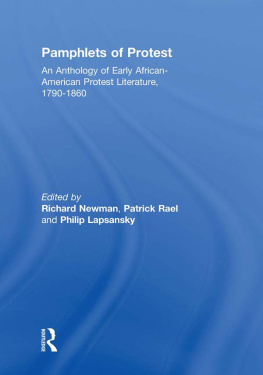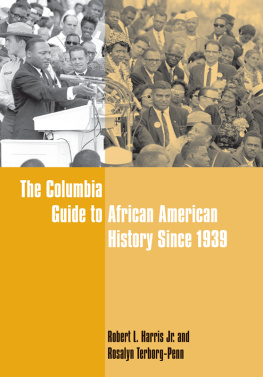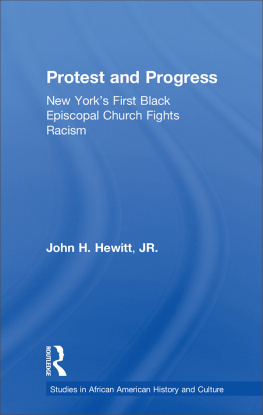Pamphlets of Protest
Pamphlets of
Protest
AN ANTHOLOGY OF EARLY AFRICAN-AMERICAN
PROTEST LITERATURE, 17901860
EDITED BY
RICHARD NEWMAN PATRICK RAEL PHILIP LAPSANSKY
Published in 2001 by
Routledge
711 Third Avenue
New York, NY 10017
Published in Great Britain in 2001 by
Routledge
2 Park Square, Milton Park
Abingdon, Oxon, OX14 4RN
Copyright 2001 by Routledge
Routledge is an imprint of the Taylor & Francis Group, an informa business
All rights reserved. No part of this book may be reprinted or reproduced or utilized in any form or by any electronic, mechanical, or other means, now known or hereafter invented, including photocopying and recording, or in any information storage or retrieval system without permission in writing from the publishers.
Library of Congress Cataloging-in-Publication Data
Pamphlets of protest : an anthology of early African-American protest literature, 17901860 / [compiled by] Richard Newman, Patrick Rael, and Philip Lapsansky.
p. cm.
Includes bibliographical references and index.
ISBN 0-415-92443-X ISBN 0-415-92444-8 (pbk.)
1. Afro-AmericansCivil rightsHistory18th centurySources. 2. Afro-AmericansCivil rightsHistory19th centurySources. 3. Afro-AmericansPolitics and government18th centurySources. 4. Afro-AmericansPolitics and government19th centurySources. 5. Antislavery movementsUnited StatesHistory19th centurySources. 6. Protest literature, American. I. Newman, Richard. II. Rael, Patrick. III. Lapsansky, Philip.
E184.6.P36 2000
323.1196073dc21 00-038254
Contents
This project has been a collaborative endeavor from its inception. The book began as a series of conversations among the editors about black pamphleteering. It then evolved with the help of numerous scholars, students, and many others. It is a pleasure to thank them now in print: at Routledge, Derek Krissoff encouraged the editors at the earliest possible stage and remained a constant source of encouragement and insight. Deirdre Mullane helped broaden the project, making it a much larger and more important piece of scholarship. She not only encouraged our effort but generously offered her commentary on the introduction and made substantive comments on every one of the pamphlets. The editors also wish to thank the New York State African-American Research Council (particularly Anne Pope), whose early financial assistance allowed the project to move forward in an expeditious manner. Finally, the staff at the Library Company of Philadelphia provided invaluable aid in researching the pamphlets themselves. The Library Company remains a treasure of early African-American history and literature.
Rich Newman would like to thank the following people at the Rochester Institute of Technology for their support and assistance. The Faculty Research Council provided two grants which facilitated data entry and research. Glenn Kist, Paul Ferber, Andrea Walter, Ken Nelson, Rebecca Edwards, and Frank Annunziata deserve special mention for their encouragement and aid. Other individuals rendered critical assistance in the form of editing and inputting pamphlets. Thank you also to Donald Yacavone, Nicole Peradotto, Ann McDonald, Ginnie Capozzi, Annette Fazio, Ruth Newman, and Robert Newman. Finally, RIT students who took a course entitled Black Protest Before the Civil War offered invaluable comments and suggestions which have helped make Pamphlets of Protest better book.
Patrick Rael would like to thank Bowdoin College for financial assistance from its Faculty Research Fund, and acknowledge the research assistance of Eric Henry, Courtney Mongell, and Tina Nadeau. He is grateful for the loving support of Nicola Denzey.
The editors would be remiss if they did not thank the many scholars who blazed a trail in African-American history and literaturefrom Benjamin Quarles and Herbert Aptheker to Charles Davis, John Blassingame, Henry Louis Gates, Francis Foster Smith, Wilson Moses, Sterling Stuckey, Leon Litwack, Gary Nash, C. Peter Ripley, Ira Berlin, James and Lois Horton, Jean Yellin, and James Stewart, among dozens of others too numerous to mention.
We wish to dedicate this book to future students of African-American history and literature, and to Dorothy Porter, who remains a teacher to us all.
* * *
One final note on the choice of pamphlets appearing in this volume: The editors faced the dilemma confronting most compilerstoo much fascinating material to publish at once. Our list is not exhaustive. We hope that interested students and scholars will study the pamphleteering tradition in future works on black protest.
Introduction:
The Theme of Our Contemplation
Writin' is Fightin'.
Ishmael Reed
For too long others have spoken for us.
Freedom's Journal, 1827
Between the 1790s and 1860s, African-American writing became a prominent part of both black protest culture and American public life. Although denied a political voice in national affairs (as well as in most state governments), black authors produced a wide range of literature to project their views into the public sphere. Autobiographies and personal narratives told of slavery's horrors; newspaper essays railed against racism in its various forms; and poetry, novellas, reprinted sermons, and speeches preached an ethos of racial uplift and national redemption. Pamphleteering became one of the most important parts of this tradition. Yet while scholarship on African-American writing and culture has proliferated to an unprecedented degree in the past two decades, few works have focused solely on the pamphleteering genre. To take one important example, the monumental Norton Anthology of African-American Literaturean invaluable teaching resource and the most comprehensive collection of black writings designed for scholarly and classroom useskims over pamphlet literature, particularly in the period before 1830. Its survey of Black Writing in the Age of Slavery moves briskly from Phyllis Wheatley's poems of the 1770s to David Walker's Appeal in the 1830s without mentioning the names of prominent black pamphleteers such as Richard Allen, William Hamilton, James Forten, and Daniel Coker. The Norton Anthology then moves into the slave narrative genre to pick up the story of black writing.
Pamphlets of Protest focuses exclusively on black pamphleteering between the American Revolution and the Civil War: its formation as a distinct genre, its characteristics and evolution, and its meaning in both American and African-American culture. Pamphlets played a consistently important role in black intellectual life and protest. Black pamphleteers read one another, cited one another, learned from one another. Henry Highland Garnet offered perhaps the most illuminating example of such collaborative effort in his 1848 edition of Walker's Appeal, which he published alongside his own famous Address to the Slaves of United States. Garnet never met Walkernever heard his voiceexcept in the pages of the man's pamphlet. Although the Appeal had gone out of print after Walker's untimely death in 1830, old editions circulated in black communities. Garnet found the words fresh and revolutionary; he vowed to reprint the pamphletto farther preserve Walker's legacy. Similar references to pamphlets appear often in the black activist The list goes on.
Frederick Douglass famously said, Power concedes nothing without demand. It never did and it never will. Black activists fought for racial justice from the beginning of the American republic until the country's near demise during the Civil War and through the twentieth century. Black pamphleteers were a consistent part of this struggle. Their writings presented a diversity of black protest thought that demanded change and in no small way helped to achieve it.







